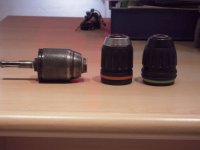There are two separate issues here, IMO. The first is properly aligning and tightening the drill initially. In the case of flatted shanks Rick is right. If you miss the center of the flats you are likely to have the drill come loose. In the case of round shanked drills I believe it is necessary, make that to read as more useful, to run the chuck down close to the proper fit and then finish off by hand. The Festool chucks have a secondary tightening phase that needs to happen if you are going to have the drill held properly. I find that I cannot control this feature through the use of the motor. It may happen or it may not, and usually does not. I admit to using the motor to change from one size to another quickly but if the drill does not align when I do this I never blame the drill or the chuck, the stars just did not align for me on that occasion and I adjust. I have had drills come loose when I did not follow what I consider proper procedure and I blame no one but myself. I don't think proper procedure is all that hard.
Secondly, the issue of the drill coming loose from rapid stopping of the chuck is not exclusive to any one chuck brand or application. We use Albrecht keyless chucks on our Bridgeport milling machines all the time. For those of you unfamiliar with these chuck take my word that the quality and holding power are way beyond anything you will get on any cordless drill. However, even with them, if they are spinning at, say 800 rpm, and you turn the spindle off and apply the manual spindle brake too aggressively the chuck will open up and the drill will fall out. Very often, even if the drill does not fall out it will slip on a subsequent hole and you will find the drill has loosened slightly from a previous stoppage.
I think these types of problem and the inherent limitations to always getting the alignment done properly when spinning a keyless chuck with the motor, followed by a lack of proper cinching afterwards by hand, may have prompted the development of the Centrotec system. If given the option I will always use the Centrotec drills as they have designed out any possibility of slippage.
One last thought, and I know some of you will argue that this is not the issue, but keyless chucks do wear out over time. We have Milwaukee cordless drill where I work and they are used for maintenance chores, usuall in metal. I personally think the chucks are a little sub-par, but I also realize they are being subjected to severe use so I temper my judgement based on that fact. Even our Albrechts have a finite life.

